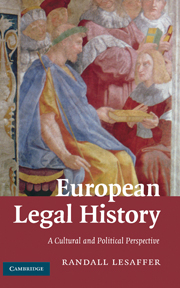Book contents
3 - Correctio (the Early Middle Ages, c.500–1000)
from Part II - The civil law tradition
Published online by Cambridge University Press: 15 August 2019
Summary
A Politics and the state
The end of Antiquity and the formation of Europe
Decedente atque immo potius pereunte ab urbibus Gallicanis liberalium cultura litterarum … nec repperire possit quisquam peritus dialectica in arte grammaticus, qui haec aut stilo prosaico aut metrico depingeret versu … Vae diebus nostris, quia periit studium litterarum a nobis, nec reperitur rethor in populis, qui gesta praesentia promulgare possit in paginis.
The Dark Middle Ages
With these words, Bishop Gregory of Tours (538/9–94) opened his chronicle about the Frankish kings of the Merovingian dynasty and their rule over Gaul. The idea of decay conveyed by his words lingered on in the collective memory of the West. The centuries between the fall of the Western Roman Empire and the eleventh century are oft en captured in terms of political, economic and cultural decline. The collapse of Roman authority in the West brought an end to Graeco-Roman civilisation. Culturally speaking, the Germanic conquerors of the Roman Empire lagged behind the Romans. They proved incapable of maintaining Roman civilisation or of replacing it with anything worthy of the name. Europe entered an age of decline and disruption: the Dark Middle Ages. This view of the era after the fall of the Roman Empire fits into the overall negative view of the Middle Ages held by the humanists, which survived well into the twentieth century. Even the re-evaluation of the Late Middle Ages by Haskins in 1927 with the publication of his Renaissance of the Twelfth Century led to little if any adjustment in the way the Dark or Early Middle Ages were perceived.
Nevertheless, already in the nineteenth century, some historians indicated a few significant periods of cultural revival in the five hundred years between the downfall of the Roman Empire and the year 1000. Like the great ‘Renaissance’ of the fifteenth century, these were labelled ‘renaissances’, thus giving the term a more general meaning than it initially had. It now referred to any cultural revival that drew on classical Graeco-Roman culture. The most important of such ‘renaissances’ in the Early Middle Ages was the Carolingian Renaissance in the Frankish Empire around 800.
- Type
- Chapter
- Information
- European Legal HistoryA Cultural and Political Perspective, pp. 123 - 191Publisher: Cambridge University PressPrint publication year: 2009



